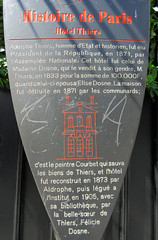Adolphe Thiers


Adolphe Thiers
(1797-1877)
statesman, historian, and President of the French Republic (1871-1873)
Family tree
Commemorated on 2 plaques
THIERS, Marie Joseph Louis Adolphe est né dans cette maison le 15 avril 1797
40 Rue Adolphe Thiers, Marseille, France where they was born (1797)
Hôtel Thiers. Adolphe Thiers, homme d'État et historien, fut élu Président de la République, en 1871, par l'Assemblée Nationale. Cet hôtel fut celui de Madame Dosne, qui le vendit à son gendre, M. Thiers, en 1833 pour la somme de 100.000F, quand celui-ci épousa Elisa Dosne. La maison fut détruite en 1871 par les communards; c'est le peintre Courbet qui sauva les biens de Thiers, et l'hôtel fut reconstruit en 1873 par Aldrophe, puis légué a l'Institut en 1905, avec sa bibliothèque, par la belle-soeur de Thiers, Félicie Dosne.
English translation: Hôtel Thiers. Adolphe Thiers, a statesman and historian, was elected President of the Republic in 1871 by the National Assembly. This hotel was that of Madame Dosne, who sold it to her son-in-law, M. Thiers, in 1833 for the sum of 100,000 F, when he married Elisa Dosne. The house was destroyed in 1871 by the Communards; it was the painter Courbet who saved Thiers's property, and the hotel was rebuilt in 1873 by Aldrophe and bequeathed to the Institute in 1905, with its library, by Thiers's sister-in-law, Félicie Dosne.
27 Place Saint-Georges, Paris, France where they lived

_-_Marseille,_rue_Adolphe-Thiers.jpg?width=250)
